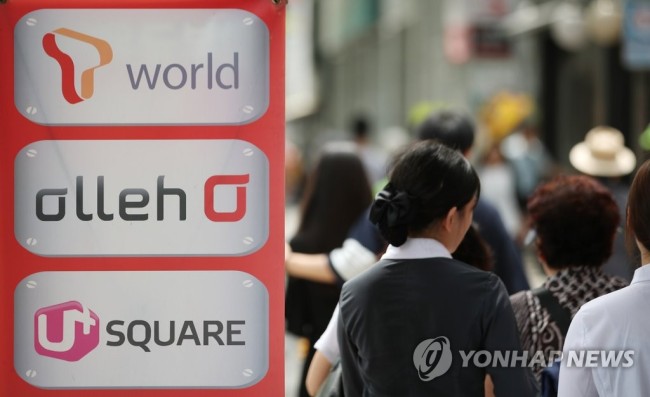South Korean mobile carriers are feeling the pinch as they are facing rising costs due to the establishment of the fifth-generation mobile network infrastructure while being pressured to cut mobile service fees, industry insiders said Sunday.
Amid the increasing pressures on the country’s three telecom companies to cut households’ mobile costs, the upcoming auction for 5G frequencies in mid-June is predicted to charge the operators huge costs, making it harder for them to seek margins.
On Thursday, the Ministry of Science and ICT announced it has set the opening price for the auction of high-end fifth-generation network frequencies -- 28 blocks in the 3.5-gigahertz spectrum and 24 blocks in the 28-Ghz spectrum -- at 3.3 trillion won ($3.11 billion).

(Yonhap)
The minimum bid for the 3.5-Ghz blocks is 2.65 trillion won and for the 28-Ghz blocks is 621.6 billion won.
The ministry has set the price of the major 3.5-Ghz frequencies slightly lower than the opening price for the 4G spectrum auction at 2.6 trillion won in 2016.
The three firms -- SK Telecom, KT and LG Uplus -- will be competing for the frequencies in mid-June in order to reach the goal of commercializing 5G service by next March.
An industry official expressed concerns about such high auction price, considering the current adverse conditions surrounding the mobile carriers.
“The telecom firm are seeing no opportunities to raise revenues due to the persisting pressures from the government to reveal cost breakdowns and lower mobile service fees,” an official said. “The 5G frequency auction would cost the three companies about 2 trillion won a year additionally, leading to delays in expansion of the country’s 5G ecosystem.”
In addition to the Moon Jae-in administration’s policy to have the telecom businesses to introduce more affordable mobile plans, such as “Universal Fare Plan” in a bid to help households lessen burdens of mobile costs since last year, the companies were ordered by a court to reveal their cost breakdowns for 2G and 3G services earlier this month.
According to a study by KT, the Korean ministry’s opening price is twice more expensive than the closing price of 5G frequencies in the United Kingdom at 1.7 trillion won recently.
Already, the three companies are paying the government a total of 1.4 trillion won every year for LTE allocations and frequency usage.
The telcos will start paying the new spectrum fees from 2019 when commercial 5G services are launched.
Based on the minimum bid prices, combined amortization expenses of the three companies is estimated to reach 389.8 billion won, according to Korea Investment & Securities, equivalent to 9.5 percent of their operating profits.
By company, the expenses would equate to 7.9 percent of the operating profit at SKT, 8.4 percent at KT and 14.6 percent at LG Uplus, the stock brokerage’s report showed.
“The opening price is significantly high,” said a KT official. “The rising costs for the mobile carriers could have negative impact on the government’s policy to reduce households’ mobile costs.”
“Excessive prices for frequency allocations would lead to higher consumer fees for 5G mobile services,” the official added.
By Song Su-hyun (
song@heraldcorp.com)






![[KH Explains] How should Korea adjust its trade defenses against Chinese EVs?](http://res.heraldm.com/phpwas/restmb_idxmake.php?idx=645&simg=/content/image/2024/04/15/20240415050562_0.jpg&u=20240415144419)